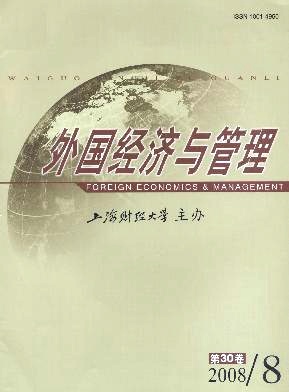论组织理论范式的转换
外国经济与管理 2008 年 第 30 卷第 08 期, 页码:18 - 22
摘要
参考文献
摘要
本文认为,组织理论范式的转换,开始了关于组织的话语、组织的建构与批判,以及组织范式自身变革的对话。更重要的是,组织理论范式的转换,显示了组织发展的新话语、新思维,加快了组织理论新范式的传播。
[1]Hermann Haken.Information and self-organization:A macroscopic approach to complex system[M].Springer:Verlag,1988:11.
[2]林毅夫.自生能力与改革的深层次问题[J].经济社会体制比较,2002,(12):32-37.
[3]Ilya Prigogine,and Isabell Stengers.Order out of chaos[M].New York:Bantam Books Inc.,1984:9.
[4]Stuart Alan Kauffman.At home in the universe:The search for the laws of self-organization and complexity[M].New York:OxfordUniversity Press,1995.
[5]Peter F Drucker.The coming of new organizations[J].Harvard Business Review,1988,66(1/2):45-55.
[6]Victoria Griffith.Emergent leadership:Bringing free market risks and rewards to command and control corporations[J].Strategy&Business,1998,4(3):1-3.
[7]Edgar H Schein.Reassessing the divine rights of managers[J].Sloan Management Review,1989,30(Win.):63-68.
[8]Tom J Peters.Liberation of management:Necessary disorganization for the nanosecond nineties[M].New York:Alfred P.Knopf,1992.
[9]Tom J Peters.Re-imagine:Business excellence in a disruptive age[M].London:Dorling Kindersley,2003:Preface.
[10]Ash Amin,and Patrick Cohendet.Architectures of knowledge:Firms,capabilities,and communities[M].London:Oxford Univer-sity Press,2004.
[11]Jean Lave,and Etienne Wenger.Situated learning,legitimate peripheral participation[M].Cambridge,England:Cambridge Uni-versity Press,1991:138.
[12]John Seely Brown,and Paul Duguid.Organizational learning and communities-of-practice:Toward a unified view of working,learn-ing,and innovation[J].Organization Science,1991,2(1):40-57.
[13]Stuart A Kauffman.Antichaos and adaptation[J].Scientific American,1991,265(2):78-84.
[14]Yochai Benkler.Coase’s penguin,or Linux and the nature of the firm[J].The Yale Law Journal,2002,112(3):369-446.
[15]Don Tapscott,and Anthony Williams.Wikinomics:How mass collaboration changes everything[M].New York:Penguin,2006.
[16]Raymond T Sparrowe,Robert C Liden,Sandy J Wayne,and Maria L Kraimer.Social networks and the performance of individualsand groups[J].Academy of Management Journal,2001,44(2):316-325.
[17]Jonathon N Cummings.Work groups,structural diversity,and knowledge sharing in a global organization[J].Management Sci-ence,2004,50(3):352-364.
[18]Armand Hatchuel.The two pillars of new management research[J].British Journal of Management,2001,12(SI):33-39.
①事实上,有关自我意识的主我(I)和宾我(me)概念由美国心理学家威廉.詹姆斯(James,1890)在其经典著作《心理学原理》一书中提出,他以多重自我的隐喻(metaphor of multiple selves)来描述人类行为。参见William James.Principles of Psychology[M].NewYork:Holt,1890:294。
[2]林毅夫.自生能力与改革的深层次问题[J].经济社会体制比较,2002,(12):32-37.
[3]Ilya Prigogine,and Isabell Stengers.Order out of chaos[M].New York:Bantam Books Inc.,1984:9.
[4]Stuart Alan Kauffman.At home in the universe:The search for the laws of self-organization and complexity[M].New York:OxfordUniversity Press,1995.
[5]Peter F Drucker.The coming of new organizations[J].Harvard Business Review,1988,66(1/2):45-55.
[6]Victoria Griffith.Emergent leadership:Bringing free market risks and rewards to command and control corporations[J].Strategy&Business,1998,4(3):1-3.
[7]Edgar H Schein.Reassessing the divine rights of managers[J].Sloan Management Review,1989,30(Win.):63-68.
[8]Tom J Peters.Liberation of management:Necessary disorganization for the nanosecond nineties[M].New York:Alfred P.Knopf,1992.
[9]Tom J Peters.Re-imagine:Business excellence in a disruptive age[M].London:Dorling Kindersley,2003:Preface.
[10]Ash Amin,and Patrick Cohendet.Architectures of knowledge:Firms,capabilities,and communities[M].London:Oxford Univer-sity Press,2004.
[11]Jean Lave,and Etienne Wenger.Situated learning,legitimate peripheral participation[M].Cambridge,England:Cambridge Uni-versity Press,1991:138.
[12]John Seely Brown,and Paul Duguid.Organizational learning and communities-of-practice:Toward a unified view of working,learn-ing,and innovation[J].Organization Science,1991,2(1):40-57.
[13]Stuart A Kauffman.Antichaos and adaptation[J].Scientific American,1991,265(2):78-84.
[14]Yochai Benkler.Coase’s penguin,or Linux and the nature of the firm[J].The Yale Law Journal,2002,112(3):369-446.
[15]Don Tapscott,and Anthony Williams.Wikinomics:How mass collaboration changes everything[M].New York:Penguin,2006.
[16]Raymond T Sparrowe,Robert C Liden,Sandy J Wayne,and Maria L Kraimer.Social networks and the performance of individualsand groups[J].Academy of Management Journal,2001,44(2):316-325.
[17]Jonathon N Cummings.Work groups,structural diversity,and knowledge sharing in a global organization[J].Management Sci-ence,2004,50(3):352-364.
[18]Armand Hatchuel.The two pillars of new management research[J].British Journal of Management,2001,12(SI):33-39.
①事实上,有关自我意识的主我(I)和宾我(me)概念由美国心理学家威廉.詹姆斯(James,1890)在其经典著作《心理学原理》一书中提出,他以多重自我的隐喻(metaphor of multiple selves)来描述人类行为。参见William James.Principles of Psychology[M].NewYork:Holt,1890:294。
引用本文
罗珉. 论组织理论范式的转换[J]. 外国经济与管理, 2008, 30(8): 18–22.
导出参考文献,格式为:
上一篇:竞合理论视角下的国际代工关系研究





 5818
5818  267
267

